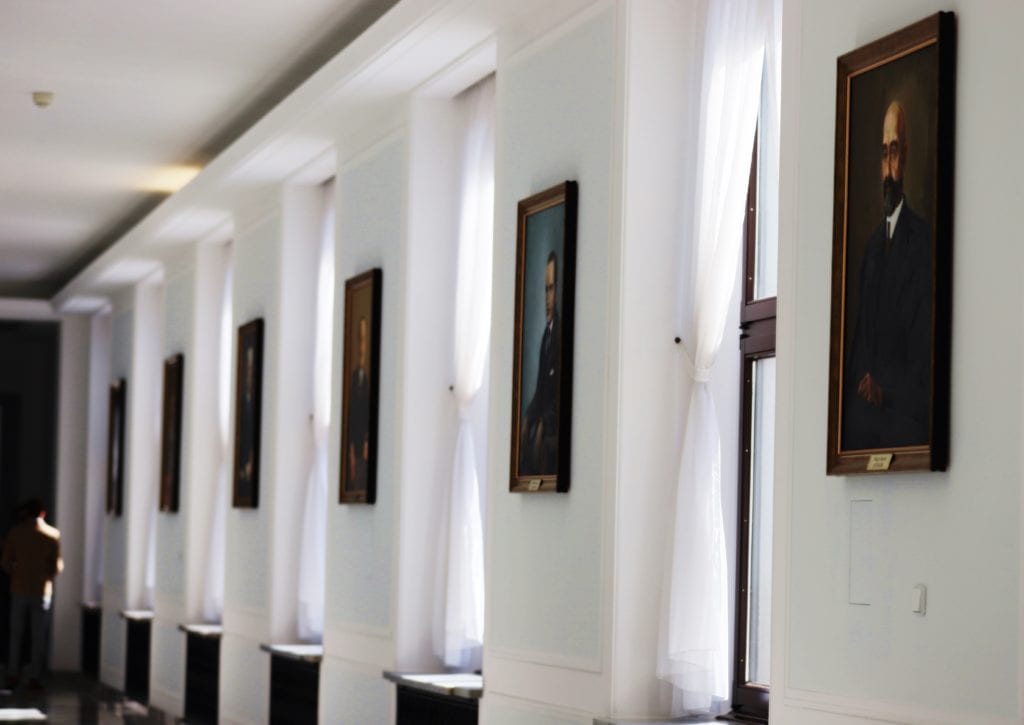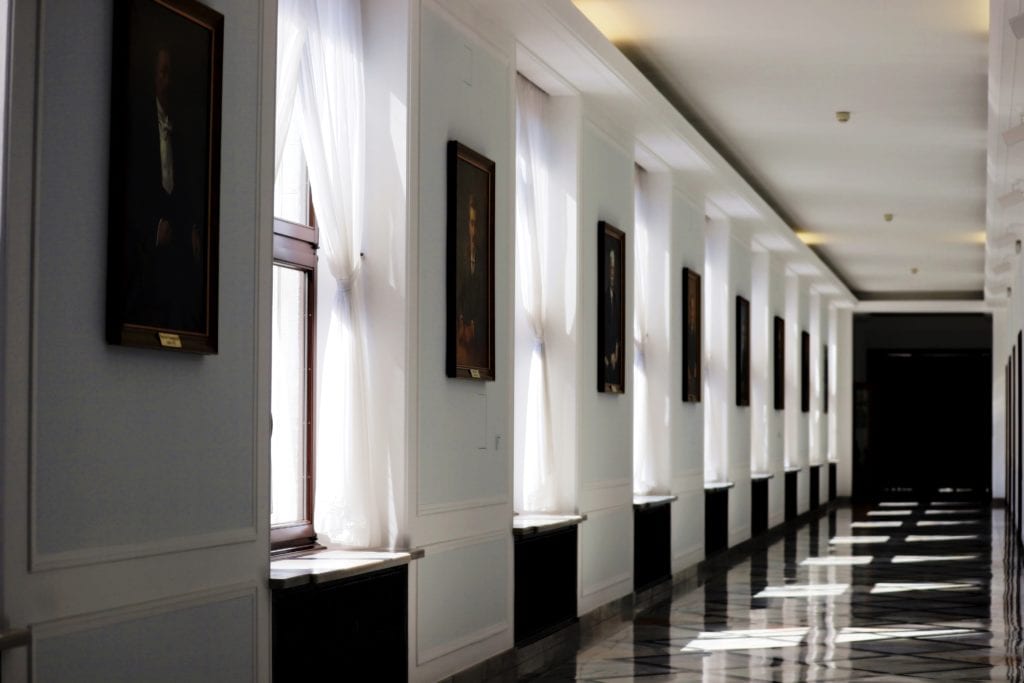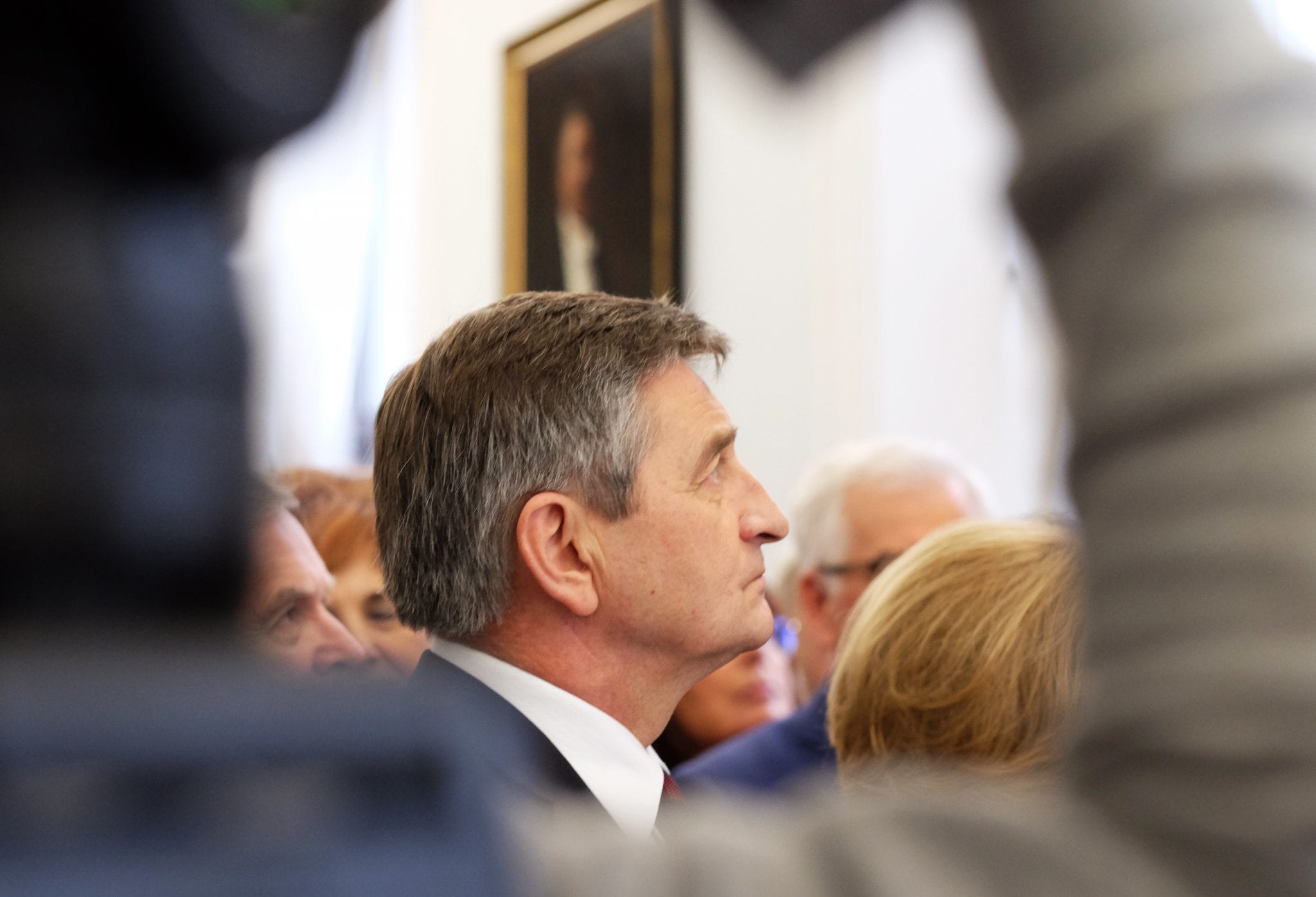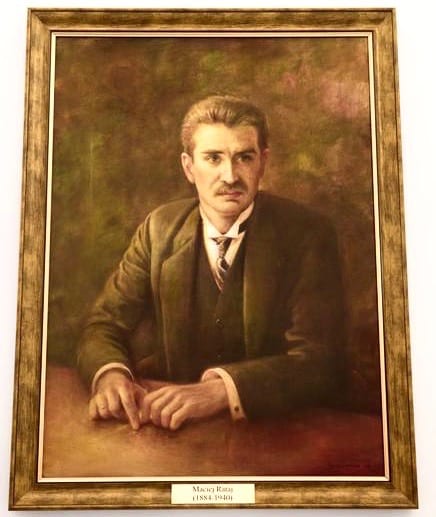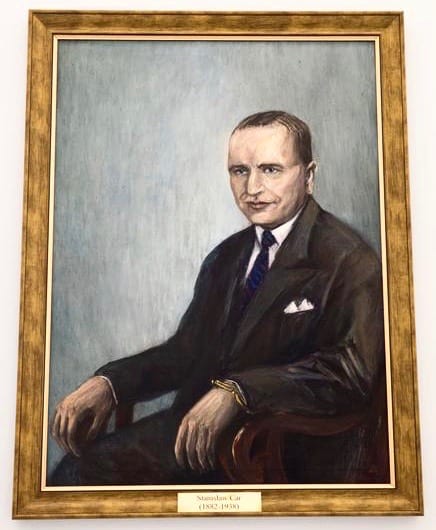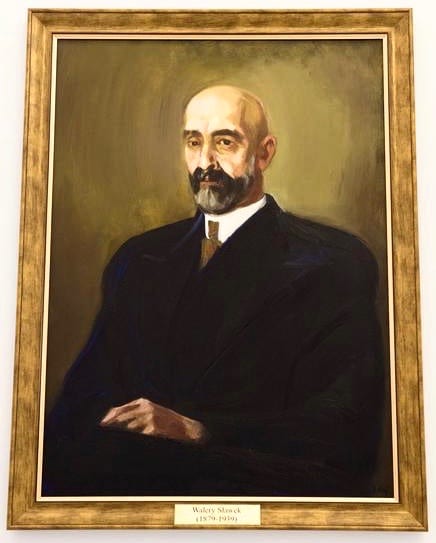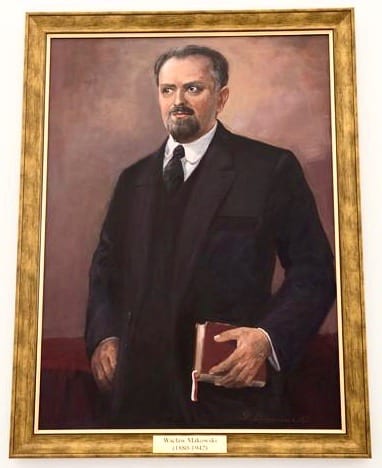On the occasion of the 100th anniversary of Poland's regaining independence, the Sejm of the Republic of Poland recalls the profiles of prominent Speakers of the Sejm of the Second Republic of Poland: Wojciech Trąmpczyński, Maciej Rataj, Ignacy Daszyński, Kazimierz Świtalski, Stanisław Czar, Walery Sławek, and Wacław Makowski.
- We pay tribute to the statesmen, the architects of modern democracy," said Marek Kuchciński, Speaker of the Sejm. He emphasized that the gallery is one of the actions undertaken to pursue the idea of a dialogue between tradition and modernity, combining the memory of history with thinking and acting towards the future, while the creation of the collection of national works of art is intended to increase the prestige of the Sejm as a patron of the arts. - I hope that the works of art placed permanently at the Sejm will be an expression of the relations between the worlds of politics, culture and art, oriented towards cooperation Pro Rei Publicae Bono," Kuchciński concluded.
Marshals of the Sejm of the Second Republic of Poland
Wojciech Trąmpczyński - Speaker of the Legislative Sejm of the Republic of Poland
(14 II 1919 - 27 XI 1922
Born on February 8, 1860 in Dębłowo near Gniezno, died on March 2, 1953 in Poznań. He came from a landowning family. He attended middle school in Trzemeszno and the famous Maria Magdalena School in Poznań, where he graduated in 1877. He studied law at universities in Berlin and Wrocław. He passed his state examinations in 1886 in Wroclaw, and then settled in Poznan, where he ran a lawyer's office from 1886 to 1892 and a notary's office from 1892. He sat on the city council of Poznan from 1901 to 1911, where he was president of the Polish circle and opposed the economic discrimination of Poles.
He wrote a famous brochure in Polish and German The law will always remain the law. In it he criticized the law expropriating Poles as contrary to the German constitutional laws of 1907. He was a member of the Prussian parliament (1910-1918) and the parliament of the German Reich (1912-1918). In both bodies - thanks to his excellent knowledge of the German language and law - he became famous for his matter-of-fact criticism of the anti-Polish government policy.
During World War I, he was a member of the secret Inter-Party Civic Committee (1916), and then of the Central Civic Committee and the Supreme People's Council (1918-1919), on behalf of which he was appointed chief president of the province and district of Poznań (January 4, 1919) until the merger with the Motherland.
By virtue of a decree of the Chief of State Józef Piłsudski, he entered the Legislative Assembly as an MP from the Prussian partitioned territories. His mandate was confirmed in a supplementary election on 1 June 1919 in the Poznań region, constituency 1, from a joint list of the United National Parties. He was elected Speaker of the Legislative Sejm on 14 February 1919, and from then on officially did not belong to any party.
During the Polish-Soviet War, he became a member of the State Defense Council and took the chair of the Central Plebiscite Committee, which coordinated preparations of the Polish side for the plebiscite in Upper Silesia.
In the autumn parliamentary elections of 1922, he was elected to the Senate of the first term (1922-1927) from the list of the Christian Association of National Unity, and became Speaker of the Senate on 1 December. After the coup d'état of Marshal J. Piłsudski as Marshal of the Senate, he contributed to calming the political mood in Greater Poland in 1926.
He was re-elected to the Sejm from the list of the National Populist Union from the Bydgoszcz constituency in 1928. In the autumn elections of 1930, he ran on as many as ten lists (district and state) for the National Party, of which he remained a member of the Political Committee. Eventually, he accepted a seat from the Szamotuły district.
In the Sejm, he was again a member of the presidium of the National Club and the National Debt Control Commission. He was a strong critic of the Sanation policy and became famous for his courageous testimony in the so-called Brest trial. In the Sejm, he expressed his negative opinion on the proposed changes to the Constitution and electoral law.
As an activist of the National Party, he was a member of the Legal Department of that party, and from 1929 he was appointed by Roman Dmowski to the Great Council of the Camp of Great Poland, although he did not play a significant role there. After 1935, he gradually withdrew from political life and came closer to the opposition group Front Morges.
He lived through the Second World War in Warsaw, where he was deported by the Germans in 1939. He maintained contact with Cyril Ratajski, the Government Delegate for Poland, and cooperated with the Central Welfare Council. After the fall of the Warsaw Uprising, he settled in Milanowek and returned to Poznan in the spring of 1945.
ANTONI CYGAN - the author of the portrait, studied in Katowice at the Faculty of Graphics of the Jan Matejko Academy of Fine Arts in Cracow. Since 1992 he has been working at his alma mater, since 2012 as its rector. The professor is the author of several individual exhibitions and has taken part in many group exhibitions in Poland and abroad. He is the author of several cycles of the Way of the Cross in the churches in Zabrze, Gliwice, Lichen and Suzuka (Japan). He also designs interiors for churches.
Maciej Rataj - Speaker of the Sejm of the 1st term
(1 XII 1922 - 26 III 1928)
Born on February 19, 1884 in the village of Chłopy near Lviv as the son of a poor farmer. He attended schools in his home village, then in Komarno and Lviv. Here, in 1904-1908, he studied classical philology at the Faculty of Philosophy of the Lviv University. He began his political activity among the academic youth in Lviv in the Brotherly Aid Society and the Tadeusz Kościuszko People's School Society circle (deputy chairman).
A member of the PSL "Piast" from 1913. He worked as a junior high school teacher, first in Lvov from 1908 and then in Zamość from 1918 where he joined the political activity of the PSL "Wyzwolenie". As an editor of 'Gazeta Zamojska' he boldly promoted the cause of Poland's independence.
Elected to the Legislative Sejm in 1919 from the PSL "Wyzwolenie" list in the Zamość constituency. He moved to Warsaw, left the teaching profession and devoted himself to parliamentary work - he joined the Sejm Constitutional Committee (deputy chairman), Education Committee (member), and Foreign Affairs Committee (member). He initiated the transformation of the previous Union of People's Deputies, a loose association of parliamentary clubs, into a single PSL club and was elected its vice-chairman. After the dissolution of the club in January 1920, he joined the PSL "Piast", where he was a member of the Supreme Council until 1931 and vice-president.
During the critical days of the Polish-Soviet War, he became a member of the State Defense Council (July 1-24, 1920), and later Minister of Religious Denominations and Public Enlightenment (July 24, 1920 - September 13, 1921) as well as head of the Ministry of Arts and Culture in Wincenty Witos's government (from July to September 1921).
He again received a mandate from his home district of Lvov in 1922 and was elected Speaker of the Sejm on December 1 of the same year. In this capacity, he served twice as head of state: after the assassination of the first President of Poland Gabriel Narutowicz (16-22 December 1922), and after the resignation of President Stanisław Wojciechowski due to the May Coup by Marshal Józef Piłsudski (from 15 May to 4 June 1926). In the post-May period, he made attempts to restore legalism, ensure balance between the executive and legislative powers, and defend the sovereignty of the Sejm.
Elected to the Sejm of the second term (1928-1930) from the state list. As a member of the Budget Committee, he demanded that the government strictly adhere to the spending of the loans passed by the Sejm. He devoted much of his time to editorial work in the weekly Wola Ludu, and to organizational activities in the party. As an advocate of uniting the people's movement, he was a member of the Covenant Commission of the People's Parties, and contributed to the merger of the PSL "Piast", PSL "Wyzwolenie", and the Peasants' Party into the People's Party on 15 March 1931. However, in 1934, he entered the Sejm in place of Wincenty Witos.
He was editor-in-chief of the Green Banner, and a member of the SL Supreme Council and Executive Committee in the years 1931-1939. From Wincenty Witos's departure for exile in September 1933, he directed the party's work. He was Chairman of the SL from 1935 to 1939. After the capitulation of Warsaw in 1939, together with Mieczysław Niedziałkowski (PPS), he participated in the establishment of the Main Political Council - an underground representation of political parties at the Service for Poland's Victory, the first underground military and political organisation.
He was imprisoned by the Germans from November 1939 to February 1940. In March 1940, he established the underground Central Management of the People's Movement.
He was arrested again on March 24, 1940 and imprisoned in the Pawiak prison, then shot in Palmiry near Warsaw.
RYSZARD KALAMARZ - the author of the portrait, studied at the Faculty of Graphics of Jan Matejko Academy of Fine Arts in Cracow. Fascinated with ballet and theater, he created series of paintings depicting characters from these worlds. The artist combines reality, fantasy and purely abstract elements. He is a recognized Polish portraitist. He created dozens of portraits, including many well-known personalities of the world of art and business. He has won several national prizes. His works have been presented at individual and group exhibitions in galleries in Poland and abroad.
Ignacy Daszyński - Speaker of the Sejm of the 2nd term
(27 III 1928 - 8 XII 1930)
Born on 26 October 1866 in Zbarazh, died on 31 October 1936 in Bystrá. He came from a family of clerks. He attended schools in his home town and then in Stanislavov; he passed his matriculation exams in Cracow in 1888. Here he began his studies at the Department of Philosophy of the Jagiellonian University (1888-1889); he continued his studies in Zurich in 1890.
From the 1880s, he was active in socialist circles. He spent many times abroad (Paris, Berlin, Vienna), where he was active as a propagandist and journalist. He played a prominent role in the founding of the Galician Social Democratic Party in Lwów in 1892, and was a member of its supreme authorities and the editor of its organ "Naprzód" from 1893. As a member of the party he participated in all the congresses of the Austrian Social Democrats, as well as in the international congresses of the Second International in 1891-1896. He led the transformation of the Polish Social Democratic Party of Galicia and Cieszyn Silesia into the Polish Social Democratic Party in 1897, and was one of its leaders. He was repeatedly arrested and imprisoned for his activities; by 1896 he had been subjected to as many as several dozen political trials. He was a member of the Austrian Council of State (1897-1918). He became known as one of the best parliamentary speakers. He led the Socialist Club and fought hard against the conservative Polish Circle.
He collaborated with the Polish Socialist Party of the Russian partition from the moment it was founded, and in the dispute that arose during the revolution of 1905 he supported the group associated with Józef Piłsudski (later PPS-Revolutionary Faction), which opposed collaboration with Russian socialists. He supported the development of the Active Combat Association and the Riflemen's Association in Galicia. He was a member of the Provisional Commission of Confederated Independence Parties.
During World War I he was one of the initiators and vice-presidents of the Supreme National Committee, a supporter of Piłsudski's insurrectionary concept and trialist program (expansion of the Austro-Hungarian monarchy by a third member - Poland). As vice-chairman of the Polish Liquidation Commission from 28 October 1918, he contributed to the liberation of Cracow from the hands of the partitioners. From November 7 to 11, 1918, he held the post of prime minister and minister of foreign affairs of the Provisional People's Government in Lublin.
Elected as a member of the Constituent Assembly from the PPS list in Kraków in 1919, he became Chairman of the Union of Polish Socialist MPs club. He led the socialist movement of the three partitioned states to unite into one PPS (congress in Kraków 23-27 April 1919). He served in party authorities as a member of the Supreme Council (from 1919), its chairman (1921-1928 and 1931-1934) and a member of the Central Executive Committee (1919-1923 and 1925-1928), and its chairman (1922-1923). He was Deputy Prime Minister in Wincenty Witos's coalition Government of National Defence from July 1920 to January 1921.
He was re-elected to the parliamentary seat from the Cracow constituency in 1922. He was a socialist candidate for the office of the President of Poland.
Deputy Speaker of the Sejm from 26 November 1925. In May 1926, he strongly supported J. Piłsudski's coup, but then quickly moved to the opposition and became one of its leading figures. In the same year, he started to publish the socialist weekly "Pobudka".
He became a Member of Parliament from the Cracow constituency in 1928. He vigorously defended the dignity of the Sejm and tried to prevent violations of the rule of law. He refused to open the session in the presence of officers on 31 October 1929. He supported the Centrolew coalition of opposition groups, and after the Sejm was dissolved in 1930, he protested against electoral fraud in an open letter to the President of Poland.
He entered the Sejm of the third term (1930-1935) from the state list, but due to severe illness he practically withdrew from political life. He was the author of many journalistic texts, Memoirs, and the founder and president (1922-1936) of the Workers' University Association.
JANUSZ SZPYT - portrait author, studied at the Faculty of Graphics of the Jan Matejko Academy of Fine Arts in Cracow in the atelier of Professor Jerzy Duda-Gracz, and then at the Faculty of Painting of the Academy of Fine Arts in Cracow. The artist is the author of family portraits, nudes and landscapes. He designs and makes arrangements for sacral interiors. His paintings are in many private collections and museums in Poland and abroad.
Kazimierz Świtalski - Speaker of the Sejm of the 3rd term
(9 XII 1930 - 3 X 1935)
Born on March 4, 1886 in Sanok, died on December 28, 1962 in Warsaw. He came from a clerical family. He studied Polish philology at the University of Lvov, where he received his doctorate in philosophy in 1908, and where he worked as a junior high school teacher between 1904 and 1914. From his school days he belonged to youth organizations representing the independence-oriented current of the socialist movement ("Promień", "Życie"). He was a member of the Active Combat Association, and later joined the Riflemen's Association in 1912.
During World War I he served in the 1st Infantry Regiment of the Polish Legions until the so-called oath crisis in 1917. He returned to Lvov and continued to work as a junior high school teacher. He joined the Polish Military Organisation, on the authority of which, in November 1918, he became a member of the Polish National Committee, the representation of the Polish community during the struggle with Ukrainians in Lwów.
Political referent in the Adjutant General's Office of Chief of State Józef Piłsudski from December 1918, verified in 1919 with the rank of major, remained in active service until 1925. He was one of the founders and members of the Józef Piłsudski Institute, dedicated to the study of the latest Polish history; maintained close contact with Marshal Piłsudski after his departure for Sulejówek.
He was appointed deputy head of the Civil Chancellery of Polish President Ignacy Moscicki on June 16, 1926, and later director of the Political Department in the Ministry of Internal Affairs. He was Minister of Religious Denominations and Public Enlightenment in Kazimierz Bartel's cabinet. After his resignation, he became Prime Minister and held this position from 14th April to 7th December 1929.
He was one of the close associates of J. Piłsudski, who invariably held the post of Minister of Military Affairs in successive cabinets. He led the election campaign of the Non-Partisan Bloc for Cooperation with Government in 1930. He entered the Sejm from the national list.
Elected Speaker of the Sejm on December 9, 1930, he held the position until the end of the term. He was a strong supporter of the April Constitution of 1935 and the new electoral law.
Senator nominated by the President of Poland and from October 5, 1935 Deputy Marshal of the Senate. Appointed Governor of Cracow, he resigned his senatorial mandate in December 1935. He held the office for only a few months, being dismissed after street incidents in Cracow. From that moment on, he lost his influence on national politics. He joined the work of the Józef Piłsudski Institute in Warsaw, becoming its vice-president in December 1936.
In September 1939, he volunteered for the army, was taken prisoner by the Germans and held in the oflag in Dobiegniew (Woldenberg) until January 1945. He did not engage in political activity after returning to Poland. Arrested in 1948, he was a political prisoner until 1956.
WIEŃCZYSŁAW PYRZANOWSKI - portrait painter, graduate of the Faculty of Painting at the Warsaw Academy of Fine Arts. He deals mainly with oil painting; the leading theme of his paintings is the Mazovian landscape. He also paints portraits and nudes. He carries out commissions connected with religious themes. He is a participant and organizer of open air painting workshops. He exhibits in Poland and abroad. His paintings are in many Polish museums, as well as in private collections in Poland, Denmark, Germany, Austria, Rwanda, Brazil and the USA.
Stanisław Czar - Speaker of the Sejm of the 4th term
(4 X 1935 - 18 VI 1938)
Born on 26 April 1882 in Warsaw. He studied law at the Warsaw University until 1905, graduated from the Odessa University in 1907. He was a court trainee between 1908 and 1911, he was entered on the list of sworn attorneys and opened his own law office in 1911.
He was a Justice of the Peace of the 11th District of the City of Warsaw, recommended by the Civic Committee of the City of Warsaw from 1915. He was a secretary of the Warsaw Bar Association delegation working on the statute of the Polish State Bar. In 1916, he met Józef Piłsudski and remained one of his closest associates until the Marshal's death in 1935.
As an employee of the Department of Justice at the Provisional Council of State (1917-1918), he was also the editor of the "Official Journal of the Ministry of Justice" and "Polish State Law Journal". From 5th December 1918, he was the Head of the Civil Chancellery of the Chief of State. He took part in the Polish-Soviet War as a lancer of the 7th lancer regiment in the 10th Infantry Division of General Lucjan Żeligowski. For his war-time service he was promoted to the rank of second lieutenant and awarded the Cross of Valour.
After the war, for many years he served as president of the Warsaw District of the Polish Reserve Officers' Association. He was also the head of the Civil Chancellery during the short presidency of Gabriel Narutowicz.
In the years 1923-1924 he ran a law practice. He was a founder and chief editor of "Palestra", a monthly magazine of the Bar Council in Warsaw. He was a prosecutor of the Supreme Court in the years 1925-1926, and again took the post of the head of the Civil Chancellery of the President of the Republic of Poland Ignacy Moscicki on 16 June 1926. In the cabinet of J. Pilsudski in the years 1926-1928, he was the undersecretary of state in the Ministry of Justice.
He was Minister of Justice in the governments of: Kazimierz Bartel and Kazimierz Świtalski (from December 1928 to December 1929), in the cabinet of Walery Slawek (from March to August 1930) and in the second cabinet of Piłsudski (from August to December 1930).
Member of the Sejm of the 3rd term (1930-1935), elected from the BBWR list in constituency number 5 in Białystok. He served as Deputy Speaker of the Sejm. At the same time, he was chairman of the Legal Committee and group leader in two committees: Constitutional and Rules of Procedure. He was a member of the BBWR club, where he was a member of the board, and from the end of August 1931, the vice-president. - vice-president.
He worked intensively on the revision of the constitution in the years 1931-1935. He was a co-author of the constitutional theses and the general referent of the draft of the constitution in the Sejm, passed and signed by the President of Poland in 1935. He was again elected to the Sejm of the Republic of Poland for the 4th term, 1935-1938, from the BBWR list, this time in constituency number 24 in Kielce. The Chamber of Deputies elected him Speaker of the Sejm on 4 October 1935. In the last years of his political activity, he strove to increase the authority and ensure considerable freedom of action of the Sejm, which was an expression of a certain opposition to the policy pursued by Ignacy Mościcki and Marshal Edward Rydz-Smigly.
He died on June 18, 1938 while serving as Speaker of the Sejm.
He was the author of numerous works on constitutionalism, statehood and law.
ŁUKASZ ZEDLEWSKI - portrait author, graduate of the Faculty of Painting at the Academy of Fine Arts in Warsaw. He received his diploma with honours from Professor Stanisław Baj's Painting Studio. Winner of the final ten of the competition "The Most Outstanding Young Painter of the First Decade of the 21st Century". (2011). Winner of the Coming Out Best Diplomas exhibition at the Academy of Fine Arts in Warsaw (2013). Since 2013 he has been working as an assistant at the All-Plastic Department of the Faculty of Conservation and Restoration of Works of Art at the Academy of Fine Arts in Warsaw. In 2018 he opened his doctoral thesis at the Academy of Fine Arts in Warsaw. He works in painting, drawing and printmaking.
Walery Sławek - Speaker of the Sejm of the 4th term
(22 VI 1938 - 27 XI 1938)
Born on November 2, 1879 in Strutynka in Podole region in an educated family. He graduated from the Leopold Kronenberg Higher School of Commerce in Warsaw in 1899 and started working in banking. He was associated with the revolutionary-independence movement. He belonged to the Polish Socialist Party, and was a member of the Central Workers' Committee (1902-1905). Together with Aleksander Prystor he co-founded the PPS Conspiracy-Boyal Organisation. During the Revolution of 1905 in the Russian partitioned territories, he supported the pro-independence movement and joined the PPS Revolutionary Wing, of which he was a member in the years 1906-1914. He took part in the creation in Galicia of the Union for Active Struggle, the Riflemen's Association, and the Polish Military Treasury as part of the Provisional Commission of Confederated Independence Parties (1908-1914).
During World War I, he participated in battles in the ranks of the Polish Legions' First Brigade in the years 1914-1915 as a staff officer and head of the Intelligence Bureau. Delegated to Warsaw in 1915, he was in charge of political and independence work. He co-founded the Polish Military Organisation and the Central National Committee, bringing together activist groups. Imprisoned several times by Russian (1903 and 1905-1906), Austrian (1910) and German authorities (internment in Szczypiorno and Modlin (1917-1918).
In the years 1918-1922, after Poland regained its independence, he was an officer on special orders from the Chief of State. He was one of Józef Piłsudski's friends and closest associates since the time of the underground movement. He graduated from the Higher Military School in the rank of lieutenant colonel (1924). He withdrew to the reserves after Piłsudski left the army. He became president of the Main Board of the Legionnaires' Union and held this position in the period 1924-1936.
After the May Coup of 1926, he returned to active duty for a short time, and then went into extensive political activity. From autumn 1927, he organized the Nonpartisan Bloc for Cooperation with the Government. He became its chairman (1928-1935) and entered the Sejm in the elections of 1928 from that party's list, also taking over as chairman of the parliamentary club. He was re-elected in 1930, and continued to head the BBWR club. He was a co-author and an ardent supporter of the Constitution of 1935 and the new electoral law.
He was Prime Minister three times: from March to August 1930, from December 1930 to May 1931, and from March to October 1935. He dissolved the BBWR and devoted himself to work at the Józef Piłsudski Institute in Warsaw, of which he became President in 1936.
Elected as an MP in the parliamentary term 1935-1938, after the death of Marshal Stanislaw Tsar he took office on 22 June 1938. In the November 1938 elections, due to a violent campaign of the Camp of National Unity against his candidature, he did not obtain a parliamentary seat.
He died in Warsaw on April 3, 1939 by suicide.
STANISŁAW BAJ - the author of the portrait, he studied at the Academy of Fine Arts in Warsaw. He lives in Warsaw and in his native village Dolhobrody on the Bug river. He is a lecturer at his alma mater. His works are in the collections of Polish museums and collections in the country and abroad. S. Baj's artistic output includes paintings, drawings and graphics. Portraits and landscapes of the Bug River dominate among his works.
Wacław Makowski - Speaker of the Sejm of the 5th term
(28 XI 1938 - 2 XI 1939)
Born on 15 November 1880 in Vilnius into an educated family. He graduated from gymnasium there in 1898. He studied law at the Imperial Warsaw University until 1902, and completed additional studies in Cracow at the Faculty of Philosophy of the Jagiellonian University, in Lvov and Paris. During his studies he belonged to a revolutionary organization of an independence character. He was arrested twice by the Russian authorities in 1901 and 1906. He began working as an assistant to a lawyer, and then participated in the establishment and actions of the Political Defenders Circle (1905-1907). During World War I, after the Russian authorities resigned from the Kingdom of Poland, he organized civic judiciary, was active in the Civic Militia in Warsaw and the Main Welfare Council (1915). Associated with political activists, after the establishment of the Provisional Council of State in January 1917, he became deputy director of its Justice Department, and between February 27 and April 4, 1918, he was the head of the Ministry of Justice.
Appointed by the Regency Council as vice-president of the Main Land Commission on 30 October 1918, he remained in this position even after regaining independence. He then became section head at the Ministry of Agriculture and State Property (1919). He was also active as a researcher and lecturer at the University of Warsaw, teaching criminal law at the Faculty of Law from 1917. In 1921 he was appointed as an associate professor, and in 1923 as a full professor of criminal law. He was a member of the Polish Codification Committee from 1919, from 1920 as the vice-president of the criminal law section.
Volunteered in the Polish-Soviet War as a prosecutor of the Supreme Military Court. Transferred to the reserve, he received the rank of colonel of the reserve Judicial Corps in 1922. He was Minister of Justice in the governments of Artur Śliwiński (from June to July 1922) and Julian Nowak (from July to December 1922), and in the government of General Władysław Sikorski, he headed this department (from December 1922 to May 1923). In three consecutive cabinets of Kazimierz Bartel, from May to September 1926, he was Minister of Justice.
He played an important role in drafting the bill on amending the Constitution (the so-called August amendment of 1926).
Elected to the Sejm from the list of the Non-Partisan Bloc for Cooperation with the Government from the Polesie constituency in March 1928. A leading figure in the BBWR club, he was actively involved in the work on the draft constitution prepared by the ruling camp; he became chairman of the Sejm Constitutional Committee.
In the November 1930 elections, he was prominent on the BBWR list in Warsaw. In the Sejm, he again chaired the Constitutional Committee. He was also a member of the Legal Affairs Committee, and after Jan Piłsudski resigned as Deputy Speaker of the Sejm, he was elected in his place on 1st October 1931.
In the next election he ran for the Senate from Warsaw. He became its vice-marshal on October 5, 1935, and at the same time chairman of the Law Commission and a member of the Inter-Parliamentary Union and chairman of the Polish group. He was a member of the Union Council. At the same time, he taught criminal and state law at the University of Warsaw. He was dean of the Faculty of Law from 1935 to 1937 and was appointed full professor of state law in 1937.
As a member of the Obóz Zjednoczenia Narodowego (Camp of National Unity) in Warsaw, he became a member of the Sejm of the fifth term, and at its first session on November 28, 1938, he was elected Speaker of the Sejm.
He chaired the last session of the Second Polish Sejm on September 2, 1939, and was interned there after the evacuation of the state authorities to Romania. He died in Bucharest on 28 December 1942.
He was the author of many scientific works on criminal and state law, co-author of the Criminal Code (1932) and the April Constitution (1935).
STANISŁAW CHOMICZEWSKI - the author of portraits, graduate of Jan Matejko Academy of Fine Arts in Cracow. His favorite painting subjects are portraits, landscapes and horses. He presented his works at many individual exhibitions in Poland and abroad. The artist takes part in painting plein-airs, also abroad. His works are in many private and museum collections.
